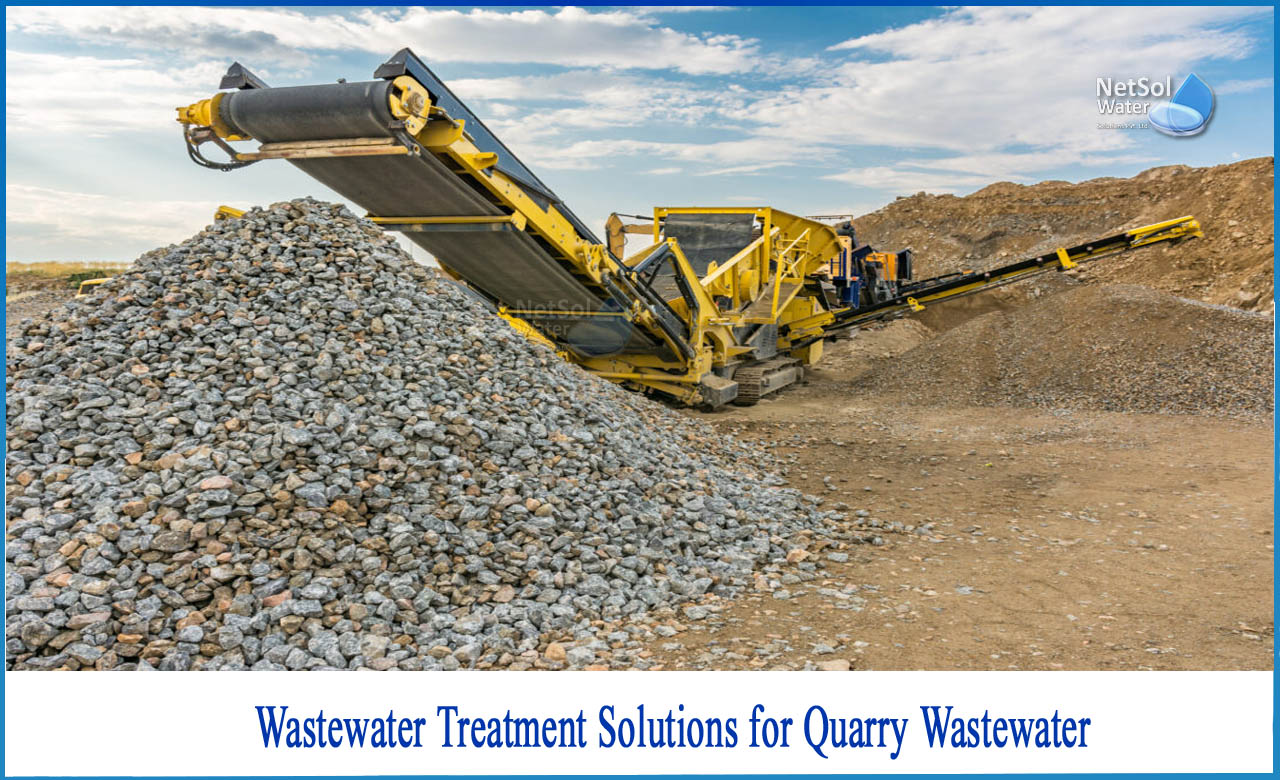What is the WWT Solutions for Quarry wastewater?
Waters from aquifers (underground water sources) and from the surface make up the majority of mine (quarry) waters (atmospheric waters).
The volume of these liquids might vary greatly. The amount of accompanying water frequently rises abruptly, especially in coal mines, due to sudden breakthroughs of water from aquifers, previously dumped workings, and surface water bodies, as well as flood and stormwater breakouts. The qualities of the strata of rocks intersected by the wells determine how contaminated the water is. The degree of mineralization of subsurface horizon fluids, as well as suspended particles in surface and groundwater, define the first contamination.
Quarry wastewater purification
Sedimentation and filtration are used to purify quarry effluent.
Precipitation of suspended coarse mineral and rock particles begins at a particular fluid flow rate, although stationary flow provides the most thorough cleansing. Purification of wastewater takes place in a variety of water-ponds, tiny excavations, underground mine workings, and unusual ponds with water standing in them for 7-12 days. Quarry wastewater is self-purified in these ponds as a result of the impact of solar radiation, the vital activity of fresh water aquaculture, and the dilution by descent from the atmosphere.
Filtering materials such as quartz sand, crushed gravel, and other similar substances are commonly employed to remove coarse particles. Even in still water, finely dispersed and colloidal particles in quarry wastewater are not entirely precipitated and are not examined by the filters. As a result, modest doses of coagulants or flocculants are added to the water for filtration. Aluminium, iron hydrosulphates, iron chloride, and metallurgical waste products containing aluminium and iron salts in substantial concentrations are the most often utilised coagulants.
Water-soluble high-molecular-weight compounds generated from plant raw materials (starch, cellulose), synthetic organic polymers (polyacrylamide), and other sources can also be flocculants.Acid quarry fluids containing free mineral acids (most commonly sulphuric) are neutralized by a variety of chemicals throughout the purification process. Calcium hydroxide (hydrated lime) is the most prevalent mineral, followed by limestone, dolomite, magnesite, and chalk.
Quarry waters with a high salt content are desalinated using distillation and electrodialysis techniques. When strong oxidants, such as chlorine, chlorine lime, or sodium hypochlorite, are introduced to bacterially polluted water, mine waters are disinfected. The availability of chemicals, the consistency of their action, and the relatively low costs of chlorination are all characteristics of the process.
Wastewater treatment on open pits
Mechanical purification by clarifying in settling ponds and filtration through arrays of overburden boulders is currently the most frequent method of wastewater treatment on open-pits.
In addition to specially constructed rock arrays, existing open-pit dumps can also be employed as filters. In order to use trash dumps or other comparable rock arrays in water filtration schemes, the following conditions must be met: -
1: To select one or more specific dumps (filtering arrays) and determine the methods for providing and discharging water;
2: To see if the dump can pass all of the clarified water at the supplied water disposal during the maximum flow period;
3: To see if the selected dump can clarify water to the highest concentration rates allowed.
When selecting a dump, keep the following factors in mind: the topography of the bedding surface to determine the best locations for clarified water supply, the direction and length of the filter, and the region of water seepage from the dump. The dump can be fed with water either by gravity or by pumps. Low permeability bases should be used to prevent leakage into the dump rock bed.
How can Netsol Water help?
Netsol Water is a significant water and wastewater treatment firm in India, offering WTP, WWTP, STP, and ETP manufacture, among other services. We specialize in a variety of wastewater treatment solutions for each industry, each with its own set of benefits. We are committed to providing our valued customers with hands-on service, expert counselling, and training.
Netsol Water is Greater Noida-based leading water & wastewater treatment plant manufacturer. We are industry's most demanding company based on client review and work quality. We are known as best commercial RO plant manufacturers, industrial RO plant manufacturer, sewage treatment plant manufacturer, Water Softener Plant Manufacturers and effluent treatment plant manufacturers. Apart from this 24x7 customer support is our USP. Call on +91-9650608473, or write us at enquiry@netsolwater.com for any support, inquiry or product-purchase related query.



